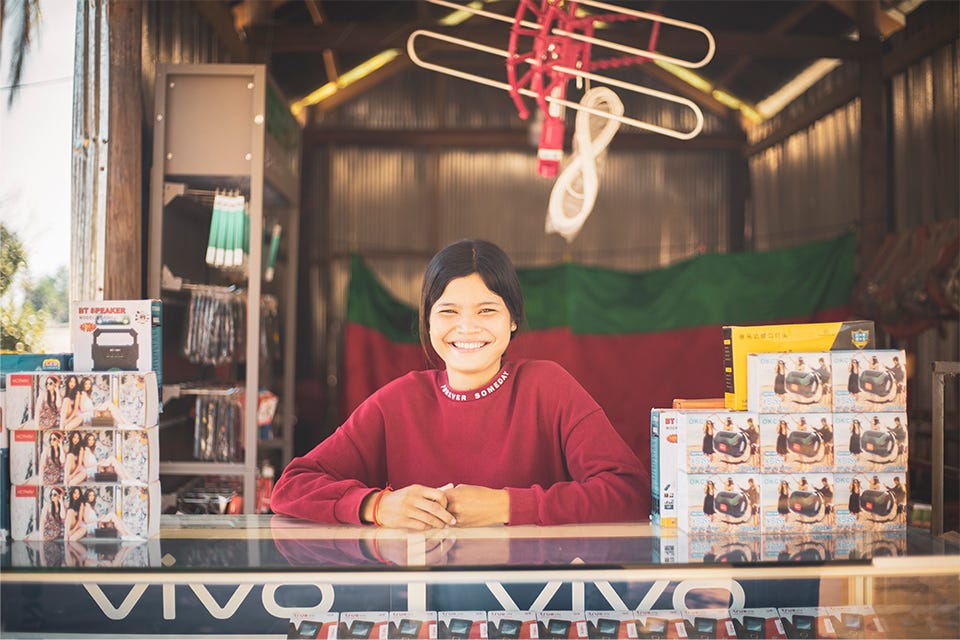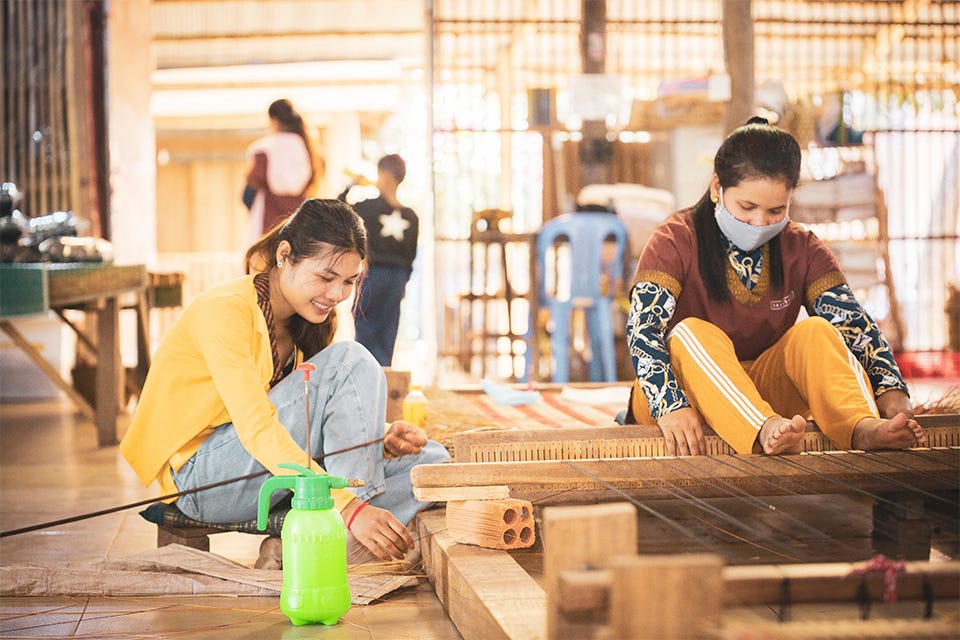How Can Soft Skills Training Improve Lives?
What influence has been discovered about soft skills training at Community Factory of SALASUSU?
SALASUSU provides skills training sessions and runs a handicraft manufacturing operation at the Community Factory (CF) located in Kchass Village, about 45 minutes outside Siem Reap. CF offers more than 60 soft skills* training programs to help women from some of the poorest, most disadvantaged backgrounds gain confidence and skills while working and leading their own lives as who they are.
This article focuses how the women working and graduating from CF have changed as a result of the soft skills training and manufacturing operation.
*At SALASUSU, we call them "life skills", which we have defined as the ability to keep working hard in order to be fully in control of one's own life. We do this by applying this idea to a total of 6 items and 22 action guidelines, but this article uses the commonly used term "soft skills”. We will explain more in another article.
Assessing the soft skills training program of SALASUSU
In the past 10 years, SALASUSU has supported 240 women through in our activities. In most cases, after two years of soft skills training while working at CF, the producers graduate and move on to new jobs and places of their own choosing. The women attend CF five days a week, receiving 75 minutes of soft skills training three times a week for the first six months, with the rest of the time spent sewing and on other manufacturing activities. Therefore, what we found in this survey is not only the effect of soft skills training alone, but also includes the effect of learning that comes from going both classes and manufacturing.
In order to measure and understand the effects of CF, SALASUSU conducted a survey from October to November 2020 based on the MSC* method, interviewing with 30 women working in CF, graduates, and their families.
*What is MSC?
MSC stands for Most Significant Change, and the technique is a form of participatory monitoring and evaluation (M&E) and developed by Rick Davies in the 1990s. MSC is a participatory technique and involves the collection and selection of stories of change, developed by program or project stakeholders (INTRAC, 2017).
What we found from the assessment
Our survey showed that soft skills training helps women to continue to grow not only while working at CF, but also after they graduate from CF. The following are three specific changes that we found:
1. The power of CF as a field
We found that CF is a place where producers can learn with and learn from each other, and that the CF environment encourages women to work to the best of their ability.
The women who receive training at CF always work as a team, both in training and in production. They respect each other by listening to each other's opinions and observing each other's actions, and this interaction contributes greatly to their own learning.
2. The ability to understand the concept of soft skills
Through understand the concept of soft skills, people become stronger and are able to think about issues that arise in areas such as things like self-confidence, self-management, and interpersonal relationships as solvable problems.
Additionally, learning soft skills has helped women who were originally unsure of themselves and unable to take action when facing difficulties to manage situations they would not been able to handle before. Also, women who were unable to relate well to others have discovered the joy of interacting with others.
3. Soft skills are portable and can be acquired
We found that the personal growth of our graduates continues outside of CF. Even after graduation, the women continued to use what they had learned. They are able to find their own solutions to the challenges they faced, and we believe that such successful experiences will help them grow mentally and develop their own lives by themselves even more.
Moreover, soft skills are skills that anyone can learn at any time in their life, regardless of their level of education. Graduates who never acquired a basic education or never completed elementary school learned and benefited from soft skills training. whether they have basic education or not, or what level of education they have. Soft skills are highly transferable skills that can be used in nearly all any situations in daily life, and it is a skills that can be learned by anyone.
Stories of trainees
“I now have confidence that I can do it” by Ron Slailua
“I used to have no self-confidence and was always hesitant to ask questions because I was afraid. But when I saw other makers actively asking questions and the staff pushing me to ask whenever I didn't understand, I realized that it really was okay for me to ask questions too, and gained the confidence to do so. When I graduated from the workshop and started an electronics store with my husband, I was also filled with anxiety, but remembering what I had learned at the workshop, I decided to be brave and try my hand at our new business, thinking that I could do it. Now we have many customers and a new store, and I am very proud of it. I want to keep the confidence I developed in the workshop and work even harder in the future.”
“It made me think that I want to grow up like the other makers around me" by Fan Kim Ho
“I used to fight with my family and friends all the time, and I was scolded a lot. At the workshop, I learned how to calm myself down when I get angry and build good relationships with others through life skills training. To be honest, it was difficult at first, but when I saw other makers working with mutual respect, I began to think, “I want to behave like that too.” After putting my new skills into practice, we had fewer fights, and were I was able to cooperate better with other makers. I was able to enjoy working every day. Thanks to this, I have more friends and I am very happy. I still have trouble controlling my anger at times, so I want to work harder and grow in the future.”
What we aim for with soft skill trainings
By offering soft skills trainings at CF, SALASUSU is supporting women to gain self-confidence and the independence needed to lead their own lives. Utilizing these efforts at CF, SALASUSU has been commissioned by JICA's Grassroots Technical Cooperation Project to provide soft skills training for vocational training schools in Cambodia. Soft skills are essential for all people and interpersonal interaction, and equip us with the ability to succeed in both everyday and unpredictable situations. capability for all industrial human resources regardless of their level. However, in Cambodia, where the basic education system is weak, the lack of these skills has been reported noted in various reports. Our goal is to create an environment where students who graduate from vocational training schools can work and grow in their own ways by acquiring not only hard skills but also soft skills which help their deeper learnings and for making good relationship with their colleagues.
Reference:
INTRAC.(2017). MOST SIGNIFICANT CHANGE. M&E Training & Consultancy. https://www.intrac.org/wpcms/wp-content/uploads/2017/01/Most-significant-change.pdf




